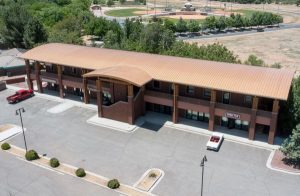Cottonwood non-profit consolidates addiction treatment services.
“Steps to Recovery Homes was started nine years ago,” said Damien Browning, 48, executive director of the organization. “My ex-wife, Anne Browning, and I started Steps to Recovery Homes with three credit cards. We are both in recovery and wanted to help others. We have had collaboration with lots of other agencies over the years.”
According to the non-profit’s website, “Recovery is a process of change through which people improve their health and wellness, live self-directed lives, and strive to reach their full potential.”
The organization was honored by the Yavapai County Board of Supervisors on Aug. 17, when it received a Proclamation of Recognition of Awards of Excellence for their prestigious awards and their dedication to the health of all citizens of Yavapai County.
Currently, homes for recovery include a location for men, housing 13 residents, a women’s home, housing eight, and a transitional home, housing five.
Recovery homes welcome men and women who are willing to take action to address their substance use and other co-occurring disorders and to work hard to embrace the tools offered to gain and maintain long-term recovery.
Transitional homes provide a step down from the more structured living environment, offering a safe place for clients to live with more freedom as they reintegrate successfully back into society.
“Our age range is 18 and up,” Browning said. “Most are in between 35 to 50. We do have one who is 20.”
All of the homes are located within four miles of a long, large building on North Main Street in front of Riverfront Park on the route into Old Town Cottonwood. The non-profit purchased the 21,000-square-foot structure in March with a low-interest USDA loan.
“We’re going to make it a healing center,” explained Browning, who has lived in Cottonwood since 1992. “By the end of May, we had moved everything over there.”
“Our Director of Operations Anji Dickson has spearheaded the whole strategic plan and the vision to evolve Steps to Recovery Homes into a true Holistic Wellness Program,” he said. “She has taken us to a new level these last few years. The whole strategic plan was to consolidate all our operations under one roof. The money we’ve been paying out for rent in all the other places we had can now go to the community as an asset that will be there forever. This way, we get to own our facility, and the organization will have some sustainability. It’s really a good move.”
Highlighting the “good move” is having the space to establish an outpatient treatment center, the Konnect Treatment Center, which provides therapy services for clients in the recovery and transitional homes and in the surrounding community.
“In healing a broken individual, I think connection is the opposite of addiction,” Browning said. “Isolation and separation formulate addiction; we feel different and then we’re isolated in our minds. It’s good if you can get people to feel they have purpose, that they’re a piece of the puzzle.”
Services offered at Konnect include individual therapy, case management and group sessions for those in the program, including people who do not occupy the organization’s recovery or transitional homes.
“Now the treatment center can help people outside of our homes,” Browning said. “It gets the community more involved and helps more people in need.”
The opening of the outpatient center will also allow staff to maximize help for clients, “so they can go down to their core issues, like anger, shame, trauma, abandonment, neglect and low self-worth.”
In addition to the Konnect Center, a scaled-down Miracles Happen Resale Store was moved to the new site, as well as a warehouse storage unit that was relocated to the basement of the new building. Also to be installed in the building is a COVID testing site. Fundraising efforts are underway to create administrative offices. Plans also call for a community center that will offer activities such as yoga and meditation.
“The last piece that will tie it all in is job development,” Browning said.
Browning has experienced addiction firsthand. Raised in Joshua Tree, California, he was a mason by trade until he was hurt on the job.
“Nineteen years of addiction – started out as alcohol, at the end, it was meth,” he said. “Incarcerated; I went to prison for five years. I lost everything. I got out in 2008 and put my life back together.”
Putting his life back together included getting his three children back, now ages 23, 19 and 18, as well as earning an associate’s degree in computer systems and applications and building a program of recovery that would help others heal in his community.
In June, Browning and Dickson traveled to Wisconsin to accept the Harold E. Hughes Award of Excellence for Exceptional Rural Program from the National Rural Alcohol and Drug Abuse Network (NRADAN, Inc.).
“Once you heal that addicted person, it has a ripple effect, with your children, with your parents,” Browning said. “I don’t know how you can figure the exact impact. With the right willingness and guidance, individuals stop self-destructing. They stop yelling at people, stop stealing, lying and hurting themselves and others. They start caring about how they come across to others and their communities. It makes our neighborhood healthy.” QCBN
By Betsey Bruner, QCBN







Leave a Reply